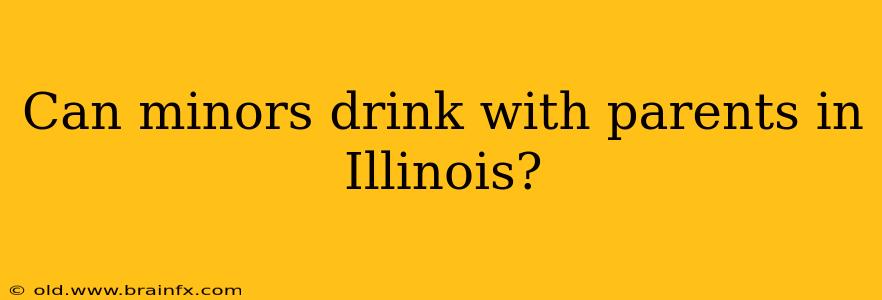Illinois law regarding underage drinking is strict, and the short answer is no, minors cannot legally drink alcohol even with their parents' permission. While some states have provisions allowing minors to consume alcohol under specific circumstances (like with parental supervision at home), Illinois does not. This article will delve deeper into the specifics, clarifying the law and the potential consequences.
Illinois's Underage Drinking Laws: The Basics
Illinois law prohibits the possession, consumption, or purchase of alcohol by anyone under the age of 21. This is enshrined in the Illinois Liquor Control Act. There are no exceptions that allow for parental permission or supervision to permit underage drinking. This is a crucial point to understand, as many mistakenly believe parental consent somehow negates the illegality. It does not.
What constitutes a violation?
A violation involves any of the following actions by a minor:
- Possession of alcohol: Having alcohol in their possession, regardless of where it was obtained.
- Consumption of alcohol: Drinking alcohol, even a small amount.
- Purchase of alcohol: Buying or attempting to buy alcohol.
Penalties for Minors
The penalties for underage drinking in Illinois can be significant and include:
- Fines: Substantial monetary fines.
- Community service: Requiring hours of unpaid community work.
- Alcohol education programs: Mandatory attendance at alcohol awareness classes.
- License suspension: Potential loss of driving privileges.
- Court appearances: The necessity to appear before a judge.
- Criminal record: A lasting criminal record, which can affect future opportunities.
The severity of the penalties depends on factors such as the amount of alcohol involved, the minor's prior offenses, and the circumstances surrounding the violation.
Parental Responsibility and the Law
While parents cannot legally allow their minor children to drink, they do bear significant responsibility in preventing underage drinking. Providing alcohol to a minor, even their own child, is a separate offense with its own set of penalties. These penalties can include hefty fines, community service, and even jail time.
Parents can be held liable for their children's underage drinking if they are found to have:
- Furnished alcohol: Provided alcohol directly to a minor.
- Allowed underage drinking on their property: Permitted underage drinking to take place on their property or under their supervision.
- Failed to supervise: Showed negligence in monitoring their children's activities that led to underage drinking.
Alternatives to Underage Drinking
Parents concerned about their children's alcohol consumption should focus on open communication, education about the dangers of underage drinking, and establishing clear expectations about responsible behavior. Many resources are available to help parents navigate this complex issue, including:
- School counselors: Often a valuable resource for advice and support.
- Community organizations: Many organizations offer alcohol prevention programs for youth and families.
- Health professionals: Doctors and other healthcare professionals can provide guidance on substance abuse prevention.
Conclusion
In Illinois, the law regarding underage drinking is unequivocal. Minors cannot drink alcohol, regardless of parental permission. Both minors and parents who violate these laws face serious consequences. A proactive and responsible approach, focusing on prevention and education, is the best way to ensure the safety and well-being of young people. If you have any concerns about underage drinking, seek guidance from the resources mentioned above. It is vital to understand the law to protect yourself and your children.

